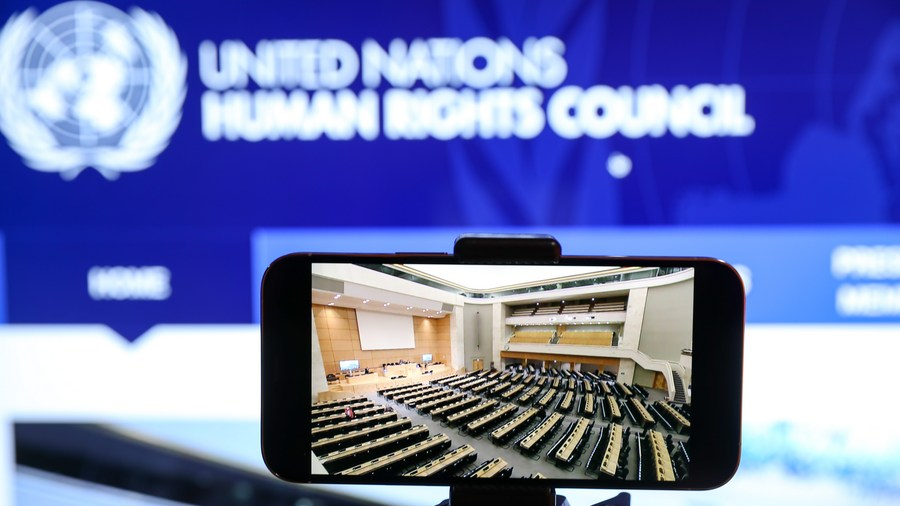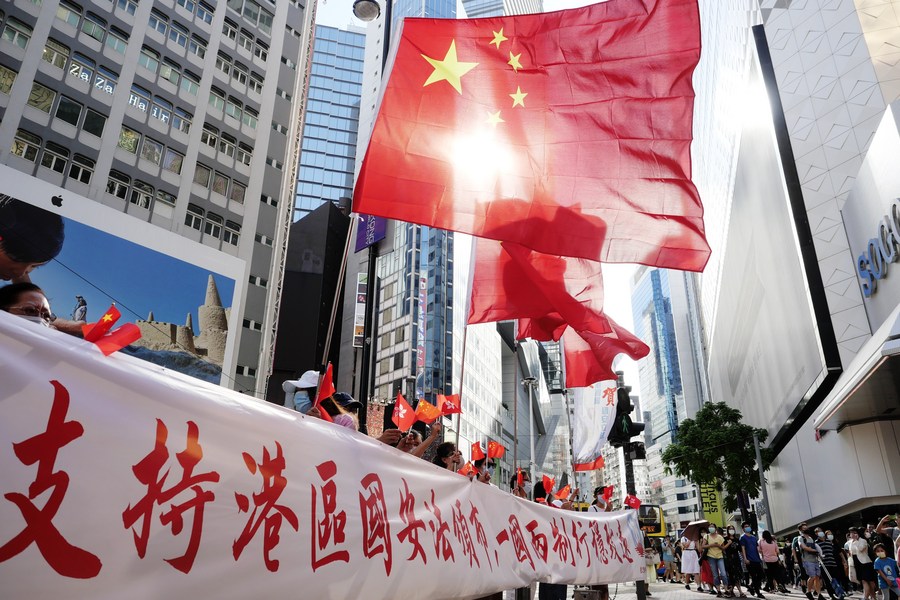
The 46th session of the UNHRC held in Geneva, Switzerland, February 22, 2021. /Xinhua
The 46th session of the UNHRC held in Geneva, Switzerland, February 22, 2021. /Xinhua
Editor's note: Azhar Azam works in a private organization as a market and business analyst and writes about geopolitical issues and regional conflicts. The article reflects the author's opinions and not necessarily those of CGTN.
China's contributions to human rights cause and protection and promotion of human rights through development have long been backed by the international community. Despite a smear campaign against China by Western rights groups such as the U.S.-controlled Human Rights Watch (HRW), a growing number of countries continue to voice support for China's efforts in Hong Kong Special Administrative Region (HKSAR) and Xinjiang Uygur Autonomous Region, appreciating the actions that are bringing peace and security in the regions.
The human rights organizations are one of the key drivers for the U.S. aggression and the implementation of its hostile objectives across the world. They maintain close links with the U.S. government, align their policies with the U.S. interests abroad and serve as recruiting agencies for the U.S. State Department. Their experts (like Sophie Richardson, the HRW China Director) work with the Congress to downplay Chinese achievements in restoring peace in HKSAR, the Tibet Autonomous Region and the Xinjiang Uygur Autonomous Region.
Since long, scholars have been concerned about the HRW push to advance the American agenda and its quietude on the "worst" human rights abuses in the Western hemisphere and failure to openly condemn the U.S. crimes. For instance, in a letter Nobel Peace Prize laureates Adolfo Perez Esquivel and Mairead Maguire alongside others held the U.S. responsible for kidnapping of Haiti's president and killing of thousands of people in the aftermath of the coup d'état.
The HRW was supposed to demand criminal investigations and prosecutions of Barack Obama-era crimes such as the continuation of CIA renditions and torture at the Bagram airbase in Afghanistan and underground prison in Somalia. Instead, one of its advisory committee members, Tom Malinowski, was appointed as the U.S. Assistant Secretary of State by the Obama administration and the HRW remained tight-lipped on these human rights violations.
Similarly the NATO Secretary General Javier Solana, who oversaw the assault on Yugoslavia in 1999 involving "violations of international humanitarian law" per HRW, joined the organization's board of directors in 2011. In turn, the Watch swung its positions in a way that was consistent with the U.S. policy, blacking out America's crimes and offenses around the world.
Formed in 1978 as the Helsinki Watch to observe the Soviet Union's compliance with the 1975 Helsinki Accords, the HRW long before exposed its closeness with the U.S. and support for its Cold War strategy of containment. Over the recent years, the Watch has tanked its credibility for working on the same pattern: propagate the U.S. capitalistic interests and vilify China's development model by releasing baseless reports on HKSAR, the Tibet Autonomous Region and the Xinjiang Uygur Autonomous Region.
At times, the organization wandered away from the "objective" and condemned the Western democratic governments, such as asking the U.S. to lift economic sanctions to help Iran fight the COVID-19 pandemic or seeking Australia review its immigration policy; the rights "industry" received a quick warning of straying from "the neutral to the corrupt" and was advised to keep focus on "human rights catastrophes" in Hong Kong, Xinjiang and other parts of the world.

Hong Kong residents celebrate the passage of the Law of the People's Republic of China on Safeguarding National Security in the Hong Kong Special Administrative Region (HKSAR) in Causeway Bay of the city, June 30, 2020. /Xinhua
Hong Kong residents celebrate the passage of the Law of the People's Republic of China on Safeguarding National Security in the Hong Kong Special Administrative Region (HKSAR) in Causeway Bay of the city, June 30, 2020. /Xinhua
The top U.S. rights groups fare poorly when it comes to openness about their sources of funding too. In 2016, the HRW was graded as "opaque" by a Georgian non-profit watchdog, Transparify. The Watch's standing bottoms out since it more recently has advanced America's geopolitical agenda by taking to supporting the overthrow of the Bolivian President Evo Morales in a violent coup and portraying rioters in Hong Kong as peaceful protesters.
In November 2019, former U.S. President Donald Trump signed the Hong Kong Human Rights and Democracy Act, which authorized the U.S. to sanction individuals involved in alleged human rights abuses in the Chinese special administrative region.
Out of sheer frustration, the outgoing Trump administration on its last day in office accused China of genocide in Xinjiang Uygur Autonomous Region and mounted pressure on the then incoming U.S. President Joe Biden to pursue a hardline against Beijing. Even Biden's nominee for Secretary of State, Anthony Blinken, asserted Trump's approach was poor and could alienate U.S. allies.
Following two decades of endless wars and overseas interventions, killing an estimated 387,000 civilians, the U.S. is trying to wipe off its blood-stained skin through its newly-released Civilian Harm Mitigation and Response Action Plan to reduce civilian casualties in armed conflicts. The HRW rushed in to describe the "significance" of the blueprint to address fundamentally-flawed U.S. military operations, application or success of which is far from guaranteed.
Amnesty International, like the HRW, is a Cold-War era organization that is known for one-sided reporting and bias toward non-Western countries especially China and whose actions to pursue a political ideology outweigh its claims. After Hong Kong was vandalized by black-clad protesters, it blamed police for the chaos. But that's what Amnesty is infamous for as years before, it compromised neutrality in exchange of heavy donations from the British and the American governments.
For the Western rights organizations, protection of human rights and civilians in armed conflicts or peace hasn't ever taken precedence over the U.S. interests. They continue to peddle the U.S. Cold War narrative by spreading lies about Hong Kong and Xinjiang. But these tactics will not succeed in a well-informed and much-vibrant international community that realizes the double standards of these rights groups and will not allow them to advance American interests under the shield of "human rights activism."
(If you want to contribute and have specific expertise, please contact us at opinions@cgtn.com. Follow @thouse_opinions on Twitter to discover the latest commentaries in the CGTN Opinion Section.)

